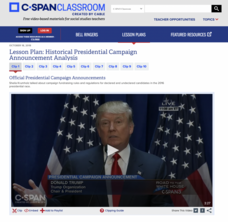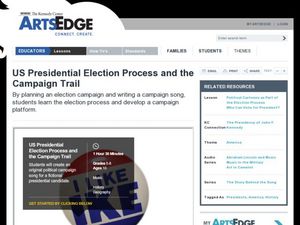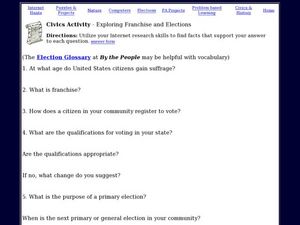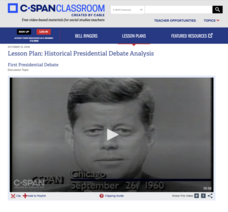Curated OER
Campaign 2000
Students research newspapers and the Internet to learn about the election. Students work in groups and choose a state that they want to compare to Florida. Students organize the data they have found into a graph labeling an "x" and "y"...
Curated OER
Lose a Vote, Gain a Vote
Students explore the issues behind close Senatorial races. They investigate the qualities of political leaders, the 2002 senatorial elections and the differences and similarities between the Republican and Democratic parties.
Curated OER
Rocking the Vote
Students explore how a presidential candidate can win the popular vote but not receive enough electoral votes to win the election. They analyze various regions' voting trends, explore how these trends reflect the outcome of the 2004...
Curated OER
Making Informed Decisions
Students discuss various issues of importance in the 1998 congressional and gubernatorial elections, create comparison charts of their states' candidates' positions on these issues, and decide which candidate they would vote for based on...
Curated OER
Preparing for Class Hearing
Students prepare and conduct In-Class Hearing. They comprehend what it means to be an informed voter. Pupils answer the following questions at the classroom hearing: "I learned that being an informed voter means _____., and Vital issues...
Curated OER
Covering the Campaign Trail: Technological Progress or Temporary Chaos?
Students study the changes in reporting and journalism techniques that have evolved due to advances in technology by reading an online transcript. They debate whether the technological advances are positive or negative in the reporting...
C-SPAN
Historical Presidential Campaign Announcement Analysis
Using the announcements of presidential candidacies, pupils consider how contenders make their initial arguments to the public. A worksheet helps structure collaborative work to analyze 10 video clips. Writing prompts allow for extension...
Carolina K-12
Are You a Democrat or a Republican? Are You Really?
Have new or soon-to-be voters examine different political parties and their platforms as they figure out which one aligns most with their beliefs. After taking a few online quizzes, students split into pairs to discuss and then in larger...
Curated OER
Presidential endorsements: Newspapers decide
Twelfth graders collect, organize, evaluate and synthesize information from multiple sources in order to draw logical conclusions. They communicate this information using appropriate social studies terminology in oral, written or...
Curated OER
Special Interests: How Would A Legislator Vote?
Students act as elected officials who must make decisions that will make someone unhappy. They consider five bills that are up for vote in light of the contributions that many special-interest groups made to their campaigns. Students...
Curated OER
Ohio Statehouse History
Fourth graders examine the history of the Ohio Statehouse and order the major historical events in its development. The instructional activity traces the development from the time of Ohio's vast wilderness to the house's completion in 1861.
Curated OER
The 1860 Election in Pennsylvania
Young scholars examine the political parties of the 1860 election and compare their platforms. In this election lesson young scholars determine the meaning of a political cartoon and predict the outcome of the 1860 election.
Curated OER
US Presidential Election Process and the Campaign Trail
Students campaign for president. In this presidential election lesson, students discuss the process of electing presidents, write their own campaign songs, research a campaign train schedule, and create campaign maps.
Curated OER
The election of 1824
Students explain why the election of 1824 was called the corrupt bargain and develop a better understanding of the Electoral College and see some of its flaws.
Curated OER
Your Vote Counts! Election Activity
Students participate in a simulated election. They serve as 'checkers', marking off names of those who vote, a ballot person hands out ballots, and ballot sorters and counters. Teacher rigs up a voting booth where voters mark ballots...
Curated OER
Exercise Your Vote!
Students watch an episode of the PBS show, "Maya & Miguel," and discuss the importance of voting. They create voting sticks in English or their native language, and organize a class election.
Curated OER
Exploring Franchise and Elections
Pupils examine the American election process. In this elections lesson, students use Internet sources to respond to 13 questions about election terminology.
Curated OER
Electronic Elections
Learners evaluate the role of voting in democratic societies and the potential of voting on the Internet.
Curated OER
Lesson Plan: The 1856 Election
High schoolers identify the key issue in the election of 1856, they also identify some of the key people invovled in the election. Students discuss the role of propaganda in politics. Also, high schoolers discuss the significance of the...
Curated OER
1960 Election
Students examine the election of 1960. In this US politics lesson students listen to a teacher driven lecture, take notes, engage in a class discussion and write a response to what they have learned regarding the 1960's presidential...
C-SPAN
Presidential Debate Analysis
The modern presidency is defined by the development of television—including the use of televised debates in the campaign. Using debates going back to the first one between John F. Kennedy and Richard Nixon, young scholars evaluate...
Classroom Law Project
What are some of today’s voting issues? Voting in Oregon, youth vote, and technology
The youth vote. Rock the Vote. Vote-By-Mail. Electronic voting. Class members investigate issues facing today's voters, and the ways they have adapted over the years to optimize voter turnout.
Carolina K-12
Get Out the Vote!
What better way to have a class learn about get out the vote campaigns than by having them create one themselves? After introducing get out the vote efforts and why they exist through videos, articles, and discussion questions, the...
C-SPAN
The Electoral College and the Constitution
What is the purpose of the Electoral College? Is it antiquated, or does it have a place in today's political climate? High schoolers view a series of video clips as they analyze the parts of the United States Constitution that address...
Other popular searches
- Election Day
- Presidential Elections
- Election Day for Kids
- 2008 Presidential Election
- Voting and Elections
- Election of 1860
- Election 2008
- 2nd Grade Election Day
- Mock Election
- Election Day Activities K 3
- Abraham Lincoln Election
- 2008 Elections

























